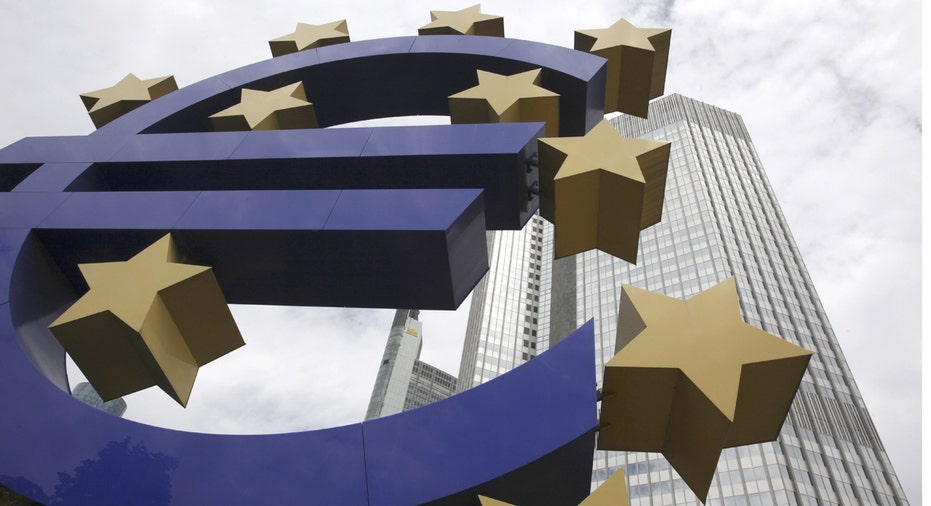ECB Likely to Point to More Easing

The euro zone economy is widely expected to need more stimulus from the European Central Bank, but it may not come at the bank's policy meeting later on Thursday.
Growth and inflation remain anemic, but the ECB has already exhausted much of its firepower, so ECB President Mario Draghi has to pick his time and probably has enough arguments to wait a bit longer.
Nonetheless, it is probably just a matter of months before the ECB eases policy further, acknowledging that inflation just isn't moving higher, despite free credit to banks, record low interest rates and money printing worth 1.2 trillion euros ($1.35 trillion) in the past year and a half.
"We expect them to act again in December, when we see scope for another rate cut, an extension of the asset-purchase programme by another six months and the ECB will also consider the possibility of buying bank bonds," Elga Bartsch, an economist at Morgan Stanley, said.
With unemployment hovering at 10 percent, governments holding back on spending as they manage down record debt piles, and industry sitting on vast unutilised capacity, growth cannot take off, putting a lid on inflation.
Indeed, price growth, holding near zero, has undershot the ECB's 2 percent target for more than 3 years and will miss it for at least another 2, a risk to the bank's credibility and the viability of inflation targeting.
But helping Draghi, the euro zone economy did mostly shrug off the shock of Britain voting to leave the European Union, and it looks to be following the modest recovery path the ECB envisaged in June - albeit with recent signs of Germany slowing.
Monetary conditions have also remained broadly stable, bank lending is picking up and Germany raised the prospect of a tax cut, music to Draghi's ears as he has often called on governments to help out.
The U.S. Federal Reserve's rate hike plans may also play a factor. Any ECB action could strengthen the dollar, making the Fed's job tougher, an outcome the ECB is keen to avoid.
"The ECB seems to be increasingly aware of the adverse effects of its current monetary policy stance," ING economist Carsten Brzeski said. "Therefore, the hurdle to either deliver a bit more of the same or enter more unchartered territory has increased."
NO MOVE
Nearly all analysts polled by Reuters expect rates to remain unchanged on Thursday and most predict that they have already bottomed out. Yet, they also expect the ECB's 80 billion euro monthly asset buys to be extended before the end of the year as they are now set to expire next March, too soon for inflation to rebound.
With the case for a steady hand weakened by dimming inflation prospects, some analysts expect a six-month extension of asset buys to be announce on Thursday.
Indeed, fresh quarterly forecasts to be unveiled by Draghi, could show a slightly lower path for underlying inflation while recent research published by the ECB suggested that long term inflation expectations are drifting lower, an indication of waning confidence in the ECB's policies.
Market based inflation expectations are also back to lows hit after the Brexit vote and most recent Germany data have also disappointed.
But even a simple extension of the 1.74 trillion asset purchase programme, started in March 2015, is not so easy as the ECB is running out of bonds to buy due to its self-imposed constraints.
The choice is then between tweaking purchase rules or going for a bigger redesign.
Easiest options could include buying bonds yielding less than the bank's -0.4 percent deposit rate, extending the maturity range of eligible bonds to 30 years from 20 years and buying an even bigger portion of a certain bond issue.
Bigger changes could involve the purchase of new types of assets, like bank bonds, non performing loans or in the extreme case, stocks.
Still, each of these changes would generate concern or even outright opposition from the hawks and the growing camp of moderates on the Governing Council, who worry about the unintended negative effects of the ECB's extraordinary stimulus.
"The case for doing more is strong at Thursday's meeting," JPMorgan economist Greg Fuzesi said. "And yet there is no sign that any action will be taken."
The ECB announces its rate decision at 1145 GMT and Draghi holds his regular news conference at 1230 GMT,
($1 = 0.8891 euros)
(Editing by Jeremy Gaunt.)



















